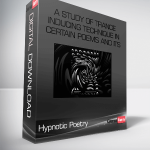Hypnotic Poetry – A Study of Trance – Inducing Technique in Certain Poems and Its Literary Significance
$28.00
As likely as not the listeners have no texts with which to follow the reading; some of them may even be sitting with eyes half shut. To many poems they are cold and indifferent, but unexpectedly they yield themselves to some one…
- Description
Description

Hypnotic Poetry – A Study of Trance – Inducing Technique in Certain Poems and Its Literary Significance
Lifetime support – Download unlimited when you buy Hypnotic Poetry – A Study of Trance – Inducing Technique in Certain Poems and Its Literary Significance Course at Course Farm. The market leader in online learning – Offers a variety of diverse topics: Internet Marketing, Forex & Trading, NLP & Hypnosis, SEO – Traffic, …
- Front Matter
- (pp. i-vi)
- Save
- Cite this Item
-
-
FOREWORD
(pp. ix-x)
James H. LeubaPOETICAL criticism is in much need of an assistance which the psychologist only can give. One must turn to him to learn what is the effect of word-sounds, of refrain, of length of line, of rime, of different rhythms, etc. One of the merits of Mr. Snyder is to have isolated for treatment what seems to me the most interesting and consequential of the psychological problems confronting the student of poetry.
The significance of states of partial trance in the life of humanity, whether produced by drugs like alcohol and hashish, or by psychical methods, such as those of the…
- Save
- Cite this Item
-
-
I SPELLWEAVING POEMS
(pp. 1-10)
I suppose almost every lover of poetry has been impressed by the ease with which a good reader is occasionally able to put a roomful of people under a sort of spell by reading certain poems. It is a spell not merely of silent attention but of intense emotional sympathy with the poet and the poem in question.
As likely as not the listeners have no texts with which to follow the reading; some of them may even be sitting with eyes half shut. To many poems they are cold and indifferent, but unexpectedly they yield themselves to some one…
- Save
- Cite this Item
-
II AN ILLUMINATING HYPOTHESIS
(pp. 11-23)
Lifetime support – Download unlimited when you buy Hypnotic Poetry – A Study of Trance – Inducing Technique in Certain Poems and Its Literary Significance Course at Course Farm. The market leader in online learning – Offers a variety of diverse topics: Internet Marketing, Forex & Trading, NLP & Hypnosis, SEO – Traffic, …
Reverting to the two contrasting lists of poems on page 8, we see that they present a peculiar critical puzzle for our solution.
Here are two groups of poems; all the poems are popular; nearly all of them have stood the test of time; yet, though we can understand in most essentials the technique by which the intellectualist poems achieve their results, we are baffled by the technique of the spellweaving poems.
We are, in fact, so seriously baffled that many critics refuse a place of honor to poems likeEvangelinewhich have endeared themselves to hosts of readers. The…
- Save
- Cite this Item
-
III HYPNOTISM AND OTHER TRANCES
(pp. 24-37)
Before proceeding to argue whether the poems I have called “spellweaving” are actually capable of producing a light state of trance in the listeners, it is necessary to review briefly certain well-established facts about hypnosis and other somewhat similar states of trance.
I shall begin with hypnosis, which has been made the subject of extended investigation under laboratory conditions, and then consider certain other analogous trances. In making this review I shall omit all controversial matters (especially the moot point as to whether hypnotic or psychoanalytical treatment is better for certain nervous disorders), holding fast to the facts on which…
- Save
- Cite this Item
-
IV EVIDENCE
(pp. 38-62)
As soon as I began to study the matter carefully, I was struck by the number of particulars in which the reading aloud of a spellweaving poem puts into action various stimuli, both physical and psychical, parallel to those commonly used to induce a light state of hypnosis, a state called “hypnoidal” by many scientists and one of “waking hypnosis” by others. And the fascinating part of the study proved to be that the more I extended it, the more I was convinced that the parallelism is an actual identity. In this chapter, then, I shall try to show that…
- Save
- Cite this Item
-
V SEMIHYPNOTIC POEMS
(pp. 63-90)
In the four preceding chapters I have aimed to explain and make at least plausible the theory that certain poems gain their power by applying the laws and principles of hypnotism, regardless of whether the poet has a theoretical knowledge of such laws. In this chapter and those that follow I shall assume that the theory is true, at least to the extent of using it as a working hypothesis for criticism.
Hypnotic technique in poetry provides a short cut or special route to the mood ofecstasyin which the listener often experiences the maximum enjoyment of a work…
- Save
- Cite this Item
-
VI POETIC INSPIRATION
(pp. 91-103)
So much has been written, ever since the time of Plato, about “poetic inspiration” that we all know well enough what the vague phrase means, without having a clear conception of how the phenomenon is produced. The poetic “frenzy,” “fury,” “ecstasy,” or “inspiration” is a rare condition in which the poet is carried “out of himself,” as we say, into a mood of sublime elevation; and in that mood, happily for us, he is articulate. The question of supreme interest is, what lifts him? What forces combine to turn the mere man into the “inspired” poet for a few minutes…
- Save
- Cite this Item
-
VII FREE VERSE IN AMERICA
(pp. 104-119)
Not long ago I suggested to a friend that an interesting lecture might be given on “The Rise and Fall of Free Verse in America,” a consideration of why the form had been so popular between 1910 and 1920, and why it is now dead. I was promptly brought to book, however, by a citation of statistics about the current vogue of Miss Amy Lowell’s work. Since her work still sells well—not only new (posthumous) volumes but re-issues of the old ones—it follows that free verse is not dead. The public still likes it and pays for it….
- Save
- Cite this Item
-
VIII IS POETRY AN ESCAPE FROM REALITY?
(pp. 120-128)
The “new psychology” has brought a new complaint against poetry: “Poetry,” we are now told, “is merely an escape from reality.” Personally I have a good deal of respect for certain phases of the new psychology when it is treated by serious-minded people who have something more than a smattering of Freudianism. Let us examine the charge and see whether another idol of ancient superstition is to be shattered, or whether the attack is merely an effort to “debunk” something that has no “bunk” about it.
Historically there has always been a controversy over the apparent untruthfulness of poetry. Almost…
- Save
- Cite this Item
-
IX THE SEAT OF THE SCORNFUL
(pp. 129-146)
In this chapter I wish to indulge in a little protest against those current critical prejudices which militate most strongly against the proper appreciation of hypnotic and semihypnotic poetry. The topic is one which some readers might wish to see expanded to include all the common fallacies of criticism by which our good sense is offended—truly a legion! But there are a few—some of them rather subtle—which are marshalled against this special kind of poetry so often that a volume like this would be incomplete without an attempt to neutralize their pernicious effect.
I do not believe criticism…
- Save
- Cite this Item
-
X TOWARDS A SOUNDER CRITICISM
(pp. 147-156)
In working towards a sounder criticism of poetry, something can be accomplished by the negative process of shunning the pitfalls discussed in the preceding chapter. If we avoid the prejudices due to jealousy, if we read aloud poems that ought to be read aloud, if we refrain from dissecting works of art that can only be experienced as wholes, if we modify a little our superstitious fear of the didactic, and if we keep clear of those controversies which are inherently futile, we shall at least have made a start. But something more positive is desirable.
In a general way…



